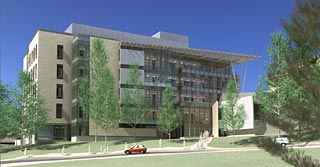UC Berkeley Press Release
CIRM awards $20 million for stem cell research facilities
BERKELEY – The California Institute for Regenerative Medicine today (Wednesday, May 7) awarded $20.18 million to the University of California, Berkeley, to build centralized stem cell laboratories on campus in a new biomedical research building now under construction.
 Architectural sketch of the planned Li Ka Shing Center for Biomedical and Health Sciences as seen from the south. Two floors of the Li Center, slated for completion in 2010, will be devoted to research on stem cells to discover the fundamental causes of disease and new treatments. |
The funding was authorized in 2004 when voters approved Proposition 71, which committed $3 billion in bond funds over 10 years to stem cell research, in particular to embryonic stem cell work not supported by the federal government. After several court fights, the research money began flowing to state scientists in April 2006, and the institute - the state's stem cell agency - has already distributed $260 million.
"This Prop. 71 stem cell research facilities program is one of the largest building programs ever dedicated for a new field of medical science, and it will deliver an impact that will be felt world-wide," said Robert N. Klein, chairman of the governing board of the California Institute for Regenerative Medicine (CIRM). "As a patient advocate, I am inspired by the amount of leverage California research institutions have contributed from their charitable donors and from their reserves. Their incredible commitment underscores the promise that stem cell research holds for patients suffering from chronic disease and injury."
Prior to today, UC Berkeley had received $7.8 million from the institute in research funds, grants to train graduate students and postdoctoral fellows, and monies to build a small new shared facility and to purchase essential laboratory equipment to conduct stem cell research.
"We currently have a very vibrant stem cell effort on campus, but it is very decentralized, with 28 researchers spread out in eight different buildings," said UC Berkeley chemical engineering professor David Schaffer, who is associate director of the Berkeley Stem Cell Center, a multidisciplinary group of researchers who use adult or embryonic stem cells. "The CIRM grant will allow geographic centralization that is crucial to fostering collaboration and interaction among campus investigators and allow us to invite visiting scholars to enhance research on campus."
In addition to 28 campus investigators, the Berkeley Stem Cell Center includes 12 other collaborators from Lawrence Berkeley National Laboratory and the Children's Hospital Oakland Research Institute.
The new funding will go toward the construction of two floors of stem cell research labs and shared equipment in the planned Li Ka Shing Center for Biomedical and Health Sciences. The new building, slated for completion in 2010, is being made possible by a $40 million lead gift from Hong Kong philanthropist and entrepreneur Li Ka-Shing and other private and state funds. Li's gift, along with other campus resources, state and private funds, will make up the difference between the California Institute for Regenerative Medicine grant and the anticipated $78.6 million cost of the new stem cell laboratory space in the Li Center.
"When I made a gift to support the establishment of the Li Ka Shing Center for Biomedical and Health Sciences at Berkeley, I was inspired by the passage of Prop. 71 and the promise of significant advances in stem cell research," Li said in an e-mail from Hong Kong. "I am pleased to partner with UC Berkeley and with CIRM to support focused efforts targeting the root causes of some of today's most devastating diseases and translate discoveries into new therapies."
Out of a total of 200,000 gross square feet in the planned Li Ka Shing Center, about 60,000 gross square feet of space will house 12 laboratories devoted to stem cell work, including human embryonic stem cell work. Because the space will be built with state and private funds, researchers will have an opportunity to study embryonic stem cell lines not on the federal government registry of approved lines.
Reviewers from the California Institute for Regenerative Medicine's Facilities Working Group gave the UC Berkeley proposal a score of 88 out of 100, the third highest score among the 12 projects it approved.
The stem cell center's research emphases align with the overall mission of the campus's Health Sciences Initiative and of the Li Ka Shing Center, which will house researchers studying the molecular basis of diseases ranging from neurodegenerative and infectious diseases to cancer.
"We feel that the CIRM grant gives us a terrific opportunity to expand the aspects of our stem cell center that are focused on disease mechanisms and disease treatment," Schaffer added.
Schaffer noted that even if the next U.S. president removes the blockade on federal funding for research on new stem cell lines, the flat National Institutes of Health budget of past years is likely to continue for at least another year, which means a decrease in inflation-adjusted dollars for all biomedical research.
"When you compare Prop. 71 funds to what the federal government and other states are spending for stem cell research, it really means that California is going to be a very strong center for stem cell research in the future," he said.

